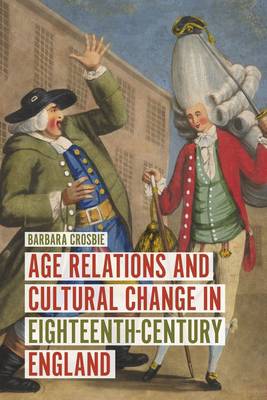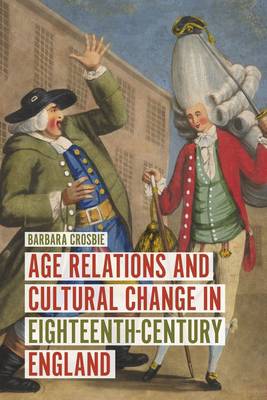
- Retrait gratuit dans votre magasin Club
- 7.000.000 titres dans notre catalogue
- Payer en toute sécurité
- Toujours un magasin près de chez vous
- Retrait gratuit dans votre magasin Club
- 7.000.0000 titres dans notre catalogue
- Payer en toute sécurité
- Toujours un magasin près de chez vous
Age Relations and Cultural Change in Eighteenth-Century England
Barbara Crosbie
177,45 €
+ 354 points
Description
Interactions between age groups were central to major social and cultural developments in eighteenth-century England, and this book serves as a powerful reminder that people lived through not in the past. This book explores the links between age relations and cultural change, using an innovative analytical framework to map the incremental and contingent process of generational transition in eighteenth-century England. The study reveals how attitudes towards age were transformed alongside perceptions of gender, rank and place. It also exposes how shifting age relations affected concepts of authenticity, nationhood, patriarchy, domesticity and progress. The eighteenth century is not generally associated with the formation of distinct generations. This book, therefore, charts new territory as an age cohort in Newcastle upon Tyne is followed from infancy to early adulthood, using their experiences to illuminate a national, and ultimately imperial, pattern of change. The chapters begin in the nurseries and schoolrooms in which formative years were spent and then traverse the volatile terrain of adolescence, before turning to the adult world of fashion and politics. This investigation uncovers the roots of a generational divide that spilled into the political arena during the parliamentary election of 1774. But more than that, it demonstrates that the interactions between age groups were central to major social and cultural developments in the eighteenth century and serves as a powerful reminder of the need to recognise that people lived through not in the past.
Spécifications
Parties prenantes
- Auteur(s) :
- Editeur:
Contenu
- Nombre de pages :
- 289
- Langue:
- Anglais
- Collection :
- Tome:
- n° 36
Caractéristiques
- EAN:
- 9781783275069
- Date de parution :
- 15-05-20
- Format:
- Livre relié
- Format numérique:
- Genaaid
- Dimensions :
- 156 mm x 234 mm
- Poids :
- 589 g

Les avis
Nous publions uniquement les avis qui respectent les conditions requises. Consultez nos conditions pour les avis.






